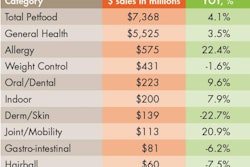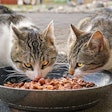The objective of this study was to evaluate the effects of feeding one- to three-day-old chicks (WHO), ground adult chicken (GRO), a chicken-based canned diet (CAN) and a chicken-based extruded diet (EXT) on apparent total tract energy and macronutrient digestibility, N balance and blood metabolites of domestic cats.
Macronutrient, energy and moisture concentrations of diets varied greatly; however, cats fed all diets maintained BW and N balance. In general, cats fed WHO had lower nutrient digestibility than those fed CAN and EXT. Cats fed GRO had greater nutrient digestibility than cats fed commercial diets. Many blood metabolites were modified by diet, but most remained within reference ranges for domestic cats. Serum cholesterol was elevated above the reference range for all treatments, and greater for cats fed WHO compared with those fed CAN, EXT and GRO. Serum creatinine concentrations were above the reference range for all treatments, and greater for cats fed GRO compared with those fed CAN or WHO.
These data indicate that the whole prey tested herein maintained short-term health and are adequately digestible for utilization in companion animal diets. Research is needed to determine the global and long-term health implications of feeding whole or ground diets to domestic cats, which may be different in terms of macronutrient, energy and moisture profiles and nutrient digestibility.
Source : K.R. Kerr et al., 2014. Apparent total tract energy and macronutrient digestibility of 1- to 3-d old, adult ground, extruded and canned chicken-based diets in domestic cats (Felis silvestrus catus). J Anim Sci online, July 2014. doi: 10.2527/jas.2013-6615.


















